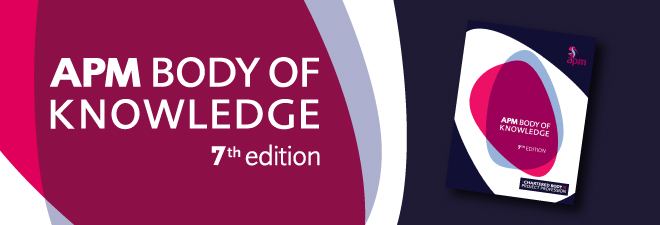BoK7: A shared success for all to enjoy

Project success is a much-debated topic and some would say (me included) that success is often in the eye of the beholder.
If we are to judge the success of the APM Body of Knowledge 7th edition (APMBoK) by measures such as on-time and to-budget delivery and meeting the scope and quality requirements set by APM’s editorial and professional standards and knowledge staff, then it’s been a big success.
Success however is always finally judged by those who use a product or service to deliver value to their organisation and so it is gratifying to hear through various channels that people like the new APMBoK – that’s it’s clear and usable with great figures and useful references – but also that it ‘feels like APM has grown-up’ in terms of its contemporary coverage of projects, programmes and portfolios in the quest to deliver change and value.
Projects always provide an opportunity for learning – new things and opportunities to re-learn or reinforce what we previously knew. On this project I have learned that time spent in structuring and storyboarding is well worth it when writing in a team. I have re-learned that although we may have different terminology for the same things across organisations that the basics actually matter – we may have new ways of doing things or expressing things but the fundamental disciplines of working in teams to plan and deliver work remain. And I’ve remembered that when a team of people come together with an intention to listen to each-other, collaborate and solve problems with a win/win approach then anything is possible.
I was honoured to be asked to be editor of the seventh edition of the APM Body of Knowledge. It was a hard slog at times, especially during the editing process, but I’m proud of what the team has achieved and I am proud to have been part of it.
Thank you – James, Clare, Scott, Darren, Darren, Dale, Charles, Phil and Tayyab.
So the new APM Body of Knowledge was launched at the APM Conference on 2 May. What can you expect from this latest version?
The APM Body of Knowledge for many years has provided the foundational knowledge resource for project managers. In the sixth edition this was extended to the management of programmes and portfolios.
In planning the seventh edition we thought carefully about the management of projects (programmes and portfolios) and the pivotal role they play in enabling the investing organisation (client/host) to delivery their strategy, and in enabling contracting organisations to deliver their business goals in support of their clients. We thought carefully about the readership of the APMBoK and the stakeholders that APM wanted to be influenced and informed by its foundational knowledge resource. Through many rounds of consultation we decided on a structure that provided different information for different constituencies.
1: Setting up for success is written primarily for those leaders within organisations who have decisions to make about the role of projects, programmes and portfolios in implementing strategy. Leaders may be in the ‘client’ or investing organisation, or in a supplier organisation that exists to deliver project-based work for clients. The ideas in chapter 1 apply in both scenarios.
2: Preparing for change is written primarily for those people charged with leading any project, programme or portfolio, of any size and complexity. It addresses early life cycle shaping and late life cycle transition into use for projects, programmes and portfolios, as well as matters of assurance, learning and maturity.
3: People and behaviours is written for anyone involved in projects, programmes and portfolios. Engaging and influencing stakeholders, forming, building and leading teams, and the generic skills and responsibilities of being a project professional are addressed with the objective of making it clear that all project-based work relies fundamentally on the ability of people to work together.
4: Planning and managing deployment is written primarily for those involved in the end-to-end process of delivering a project, whether a standalone project or one that is part of a programme and/or portfolio, and regardless of the life cycle approach taken. Although the professional domain has expanded, the detailed matters associated with defining outputs, integrated planning and controlling deployment remain.
Of course, we hope that the final product is of interest to all project professionals (the collective term we’ve used to refer to people whose daily work is related to projects, programmes or portfolios) and that the other products that APM develops to build from the APMBoK (further knowledge, qualifications, etc) serve the Chartered Project Professional well for the coming years.
You can purchase your copy of the APM Body of Knowledge 7th edition here.
Read other blogs in this series:


0 comments
Log in to post a comment, or create an account if you don't have one already.